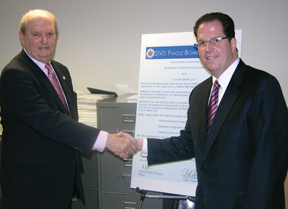Union City currently has 53 residents who are on parole.
A partnership between the Union City Police Department and the New Jersey State Parole Board to share information about them and resources was formalized last month. Union City Mayor Brian Stack and Police Chief Charles Everett signed the agreement with state officials.
“These partnerships give state parole officers and city police officers better eyes for investigation and longer arms for enforcement,” said State Parole Board Chairman Peter Barnes. “State parole officers develop in-depth intelligence through unannounced interviews at parolees’ homes. Municipal police cover the streets at all times. By combining their resources, both agencies will greatly enhance public safety and keep parolees accountable for their successful reentry into society.”
Stack said, “This new relationship with the State Parole Board will be good for fostering a safer environment for the community and will allow both agencies to offer more effective services.”
Union City Police Captain Brian Barrett, who serves as the local liaison for the partnership, said that signing the agreement was ceremonial and that the two agencies had already been collaborating.
“It actually formalizes something that we have had for quite some time,” said Barrett. However, what is new with this agreement is weekly telephone conferences and monthly meetings.
Local police will inform the State Parole Board of any new arrests, and the State Parole Board will inform local police of any new parolees in the area and their particular restrictions.
Parolees may have a curfew or be required to work or attend rehabilitation programs. Sometimes, they are also prohibited from associating with individuals who may lead them back to crime.
Barrett said that helping these people stay away from temptation to commit crime is a big reason for the partnership.
“If they are on parole and they have the urge or they find a reason to commit a crime, [knowing that local police are involved with their parole should] make them think twice,” said Barrett. “If you are on parole and you commit a crime, you are going to go back to jail.”
He said that helping parolees live well outside of prison is a preferable way for them reintegrate into the community.
“We are not looking at this as criminal intelligence that we can [use to] go out and arrest parolees for committing crimes,” said Barrett. “We understand and very much appreciate that we are helping these individual reintegrate into society.”
The purpose of parole
Working with the State Parole Board, he said, has also helped his department better understand the purpose of parole.
“My people have learned even when you are dealing with someone who has committed a crime and is on parole, you can not jump to the conclusion that this person is a repeat offender,” he said.
He added, “Some of these people on parole absolutely deserve another chance.”
As far as additional cost for taxpayers, Barrett said there will be none.
“We are working with our available resources and we are just sharing our resources,” he said.
He added that it is not the norm for a local department to partner up with state agencies, but that his department is always looking for ways to do a better job.
“We will use any tool available to us to help us better perform our job, and that includes any outside agency, whether it be federal, state, or county,” he said.
